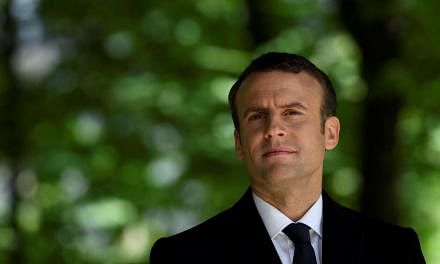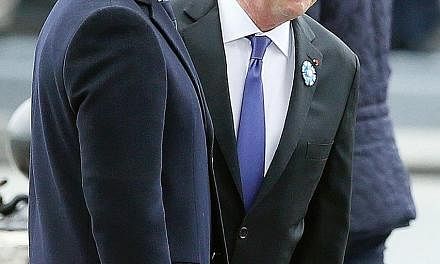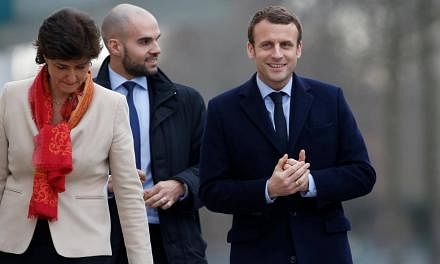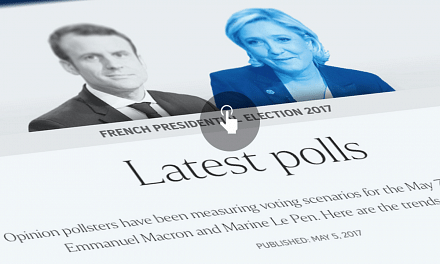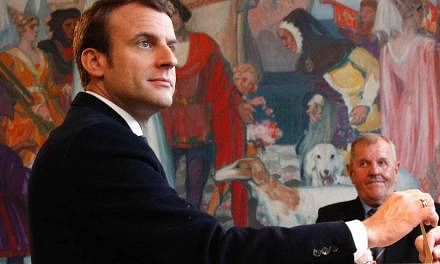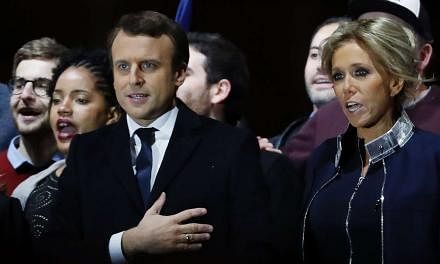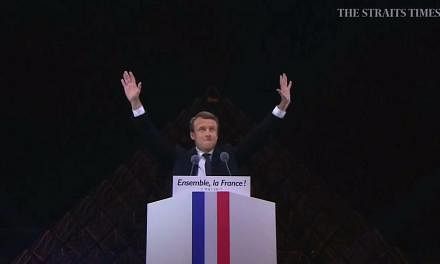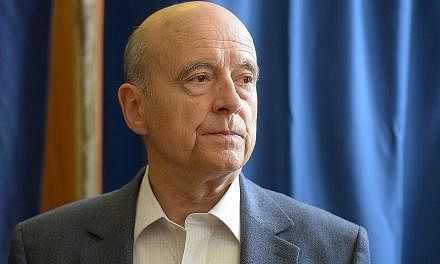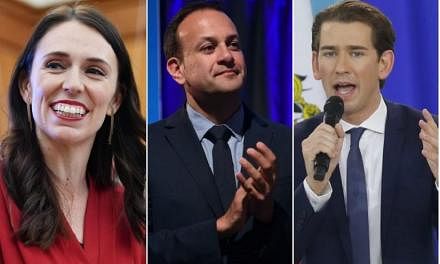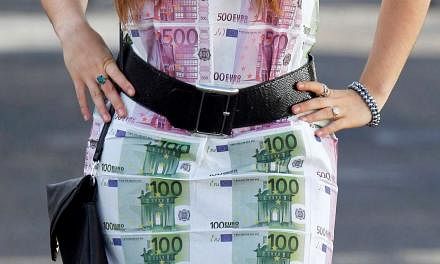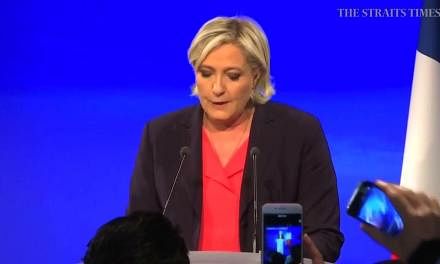PARIS (NYTIMES) - The French presidential runoff transcended national politics. It was globalisation against nationalism. It was the future versus the past. Open versus closed.
But in his resounding victory on Sunday night (May 7), Emmanuel Macron, the centrist and political novice, won because he was the beneficiary of a uniquely French historic and cultural legacy, where many voters wanted change but were appalled at the type of populist anger that had upturned politics in Britain and the United States.
He trounced far-right candidate Marine Le Pen, keeping her well under 40 per cent, even as her aides said before the vote that anything below that figure would be considered a failure.
His victory quickly brought joy from Europe's political establishment, especially since a Le Pen victory would have plunged the European Union into crisis. But in the end, Macron, only 39, a former investment banker and an uninspired campaigner, won because of luck, an unexpected demonstration of political skill, and the ingrained fears and contempt that a majority of French still feel toward Le Pen and her party, the National Front.
For the past year, a pressing political question has been whether widespread public frustration against Western political establishments had morphed into a global populist movement.
Britain's vote to leave the EU in June, followed by the presidential election of Donald Trump in the United States, created the impression of a mounting wave. Le Pen, stalwart of the European far right, was the next truly big test.
But Le Pen's challenge was different because French history is different. She has spent the last six years as president of the National Front single-mindedly focused on one objective: erasing the stain of her party's association with the ex-collaborationists, right-wing extremists, immigrant-hating racists and anti-Semites who founded it 45 years ago.
She knew - as her father, the party patriarch Jean-Marie Le Pen, always refused to acknowledge - that she would always be a minority candidate as long as she reminded the French of perhaps the greatest stain in their history, the four years of far-right rule during World War II. Inside and outside the party this process was called "demonetisation" - a term suggesting the demons still associated with her party. The French do not want them back.
"There was no choice. I couldn't vote for Le Pen. You're not going to vote for the extremist," said Martine Nurit, 52, a small-restaurant owner who had just cast her ballot in Paris' 20th Arrondissement on Sunday. She had voted for the far-left candidate Jean-Luc Mélenchon in the first round, and it was with "not an ounce of joy" that she voted for the "business-oriented" Macron in the second.
"Mostly, I voted against Le Pen," she said.
In the end Marine Le Pen failed to "undemonise," spectacularly. She failed during the course of the campaign, when her angry rallies drew the Front inexorably back into the swamp from which it had emerged. And then she failed decisively in one of the campaign's critical moments, last week's debate with Macron, when she effectively "redemonised" herself and the party, as many French commentators noted.
It was an hours-long tirade against Macron, laced with name-calling and epithets, and woefully deficient in substance. She appeared lost on subject after subject, fumbling on one of her signature issues - withdrawing from the euro - that is opposed by a majority of French. Something essential about Le Pen, and the National Front, had been revealed to France.
Macron, on the other hand, demonstrated a quality that French voters, unlike many Anglo-Saxon ones, have long found essential in their successful candidates: cool mastery of the critical issues confronting the country. Where Le Pen repeatedly lost herself in the weeds, Macron sailed right through them. Whether he will be able to translate that knowledge into action is another question.
So far he has been the beneficiary of spectacular luck.
Four months ago he was polling a distant third, an all-but-certain loser whose maverick, nonparty movement was considered promising for the future but unripe. The soaring banality of his rhetoric appeared to turn off as many voters as it inspired. His rallies began in enthusiasm but soon sagged under the weight of his speechifying.
But that was before centre-right front-runner François Fillon imploded under the weight of an embezzlement scandal, fuelling Macron's rise into the final pairing with Le Pen. Many Fillon voters turned reluctantly to Macron on Sunday, rejecting Le Pen, who had made a concerted pitch for voters of Mélenchon, the fourth-place finisher, who advocated a similar anti-capitalist platform. And Macron was lucky to face Le Pen, a candidate considered simply unacceptable by a majority of the French.
But he also played his limited hand with great skill from the beginning, outmanoeuvring his elders. First, he wisely renounced the man who had given him his break, the deeply unpopular Socialist President François Hollande, quitting his post as economy minister in Hollande's government before it was too late. Then, he refused to take part in the Socialist Party primary in January, rightly judging that party activists would dominate and choose a far-left candidate on the fringes, who would then be devoured by Mélenchon - exactly what happened.
Macron's final correct bet was that French voters, like those elsewhere, were disgusted by the mainstream parties, having judged the policy prescriptions of both the establishment right and left as failures in dealing with France's multiple ills. He positioned himself in the centre, drawing on left and right, balancing protection of the French welfare state with mild encouragement for business, in an attempt to break through France's employment and productivity stagnation.
But Macron's pro-market views stirred much opposition. Mélenchon not only refused to endorse him, but also encouraged the idea that Macron and Le Pen were equivalent menaces - a calculation endorsed by many far-left voters. Nearly half the first-round electorate voted for candidates hostile to the free market and to capitalism. Even if they voted for Macron Sunday to save the country from Le Pen, they did so without enthusiasm.
Some of the antipathy sprang from his hermetic persona, as a caricature of the elite-educated, know-it-all technocrats, perpetually encased in a dark suit, who have guided France for much its postwar history, usually from behind the scenes, and whose record is mixed.
"He's not someone I feel a lot of conviction for," said Thomas Goldschmidt, a 26-year-old architectural firm employee in Paris who voted for Macron after supporting the Socialist Benoît Hamon in the first round. "He's someone who raises a lot of questions. It's a vision of society that is too business-friendly," Goldschmidt said. "It's this whole idea of making working life more uncertain. We just can't bet on it, that everyone out there can be an entrepreneur. Society isn't built like that."
Macron seems aware that his large victory isn't a large mandate, that the pressure is now on to ensure that France's reprieve from the National Front is not just a temporary one. "If I fail to solve" France's problems "or fail to offer a solid start to solving them, in five years it will be even worse," he told the left-wing news website Mediapart on Friday night. "What nourishes the National Front will be even more virulent," he added.
Without an established party behind him, Macron's most immediate hurdle will be in June's legislative elections for France's Parliament. He has promised to field candidates in all 577 parliamentary districts, but whether he can do so is unclear. Nor is it clear how many Socialists will support his program.
The National Front could win as many as 100 seats in the new Parliament, according to some analyses, making it a formidable opposition party. Indeed, even as Le Pen was soundly defeated on Sunday, she still managed a showing that not too long ago would have been unthinkable. And in her concession, she made it clear that she was already looking toward the parliamentary elections, and the future.
Then there is the potential opposition represented by Mélenchon, who won in some of France's biggest cities - Marseilles, Toulouse and Lille - and is already claiming the mantle of Macron's principal opponent on the left. His voters, as much as Le Pen's, do not trust Macron.
Macron, in his uncharacteristically brief and sober victory speech Sunday night, recognised that he had many people to win over.
"My responsibility will be to unite all the women and men ready to take on the tremendous challenges which are waiting for us, and to act," Macron said. "I will fight with all my power against the divisions that undermine us, and which are tearing us apart."

